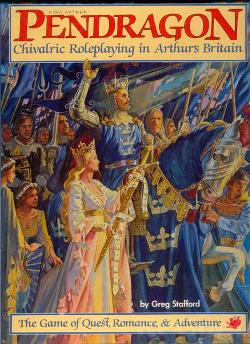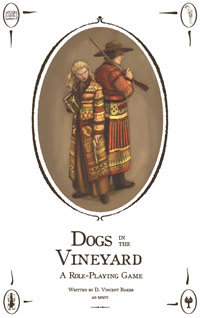
Violence: The Role-Playing Game of Egregious and Repulsive Bloodshed is a short, 32-page role-playing game written by Greg Costikyan under the pseudonym "Designer X" and was published by Hogshead Publishing in 1999 as part of its New Style line of games.

Pendragon, or King Arthur Pendragon, is a Tabletop role-playing game (RPG) in which players take the role of knights performing chivalric deeds in the tradition of Arthurian legend. It was originally written by Greg Stafford and published by Chaosium, then was acquired by Green Knight Publishing, who in turn passed on the rights to White Wolf Publishing in 2004. White Wolf sold the game to Stewart Wieck in 2009. Wieck formed Nocturnal Media, who updated and reissued the 5th edition originally published by White Wolf. In 2018, it returned to Chaosium.
Jenna Katerin Moran, previously known as Rebecca Sean Borgstrom and in early publications credited as R. Sean Borgstrom, is an American role-playing game (RPG) writer and designer, and novelist.

Guardians of Order was a Canadian company founded in 1996 by Mark C. MacKinnon in Guelph, Ontario. The company's business output consisted of role-playing games (RPGs). Their first game is the anime inspired Big Eyes, Small Mouth. In 2006 Guardians of Order ceased operations due to overwhelming debt.

Nobilis is a contemporary fantasy tabletop role-playing game created by Jenna K. Moran, writing under the name R. Sean Borgstrom. The player characters are "Sovereign Powers" called the Nobilis; each Noble is the personification of an abstract concept or class of things such as Time, Death, cars, or communication. Unlike most role-playing games, Nobilis does not use dice or other random elements to determine the outcome of characters' actions, but instead uses a point-based system for task resolution.

The Forgotten Realms Campaign Setting is a role-playing game sourcebook first published by TSR in 1987 for the first edition of the fantasy role-playing game Advanced Dungeons & Dragons that describes the campaign setting of the Forgotten Realms. It contains information on characters, locations and history. Various revised and updated editions have been produced over the years.

Robin D. Laws is a Canadian writer and game designer who lives in Toronto, Canada. He is the author of a number of novels and role-playing games as well as an anthologist.

Nightfall Games is a United Kingdom based role-playing game publishing company notable for publishing SLA Industries and The Terminator RPG.

Dogs in the Vineyard is an independently published role-playing game published by Lumpley Games in 2004 that is loosely based on the history of the Mormons.

Neuroshima Hex! is a Polish tactical board game based on the Neuroshima role-playing game. It is designed by Michał Oracz and published in 2005 by Portal, with second edition in 2008 and third in 2013. The game is set in the same post-apocalyptic world as its RPG counterpart.
Polish role-playing games have been in production since the early 1990s. Now there are several games that have been designed in Poland, as well as many translations.

Pantheon and other Roleplaying Games is a 24-page book that includes five self-contained role-playing games for 3-6 players and designed to be completed in 1–2 hours.
James Wallis is a British designer and publisher of tabletop and role-playing games.

Dark Tower is an adventure module published by Judges Guild in 1980 for the Advanced Dungeons & Dragons fantasy role-playing game.
Dave Allsop is a Scottish game designer and artist for role-playing games and video games.
Hogshead Publishing was a British game company that produced role-playing games and game supplements.

Dragon Ball Z: The Anime Adventure Game is a role-playing game published by R. Talsorian Games in 1999 that is based on the Dragon Ball Z anime.

The Extraordinary Adventures of Baron Munchausen is a tabletop role-playing game published by Hogshead Publishing in 1998 that is based on the fictional character Baron Munchausen.

Happy Birthday, Robot! is a role-playing game published by Evil Hat Productions in 2010.
The Unspeakable Oath is a game magazine that was published by Pagan Publishing from 1990 to 2001, and later by Arc Dream Publishing starting in 2010.














